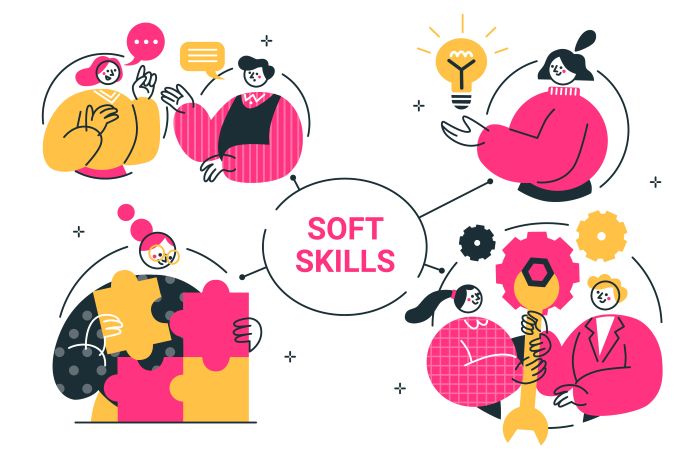Blog
How to Assess Soft Skills in an Interview: Why It Matters More Than Technical Skills?

In today’s fast-paced, collaborative business world, hiring the right person involves more than just evaluating degrees, certifications, or software expertise. Technical skills may help candidates fulfill their job responsibilities, but it’s the soft skills that truly determine how well they integrate with the team, navigate challenges, and contribute to workplace culture.
As an HR professional or hiring manager, understanding how to assess soft skills in an interview is critical. It allows you to go beyond the résumé and uncover a candidate’s interpersonal abilities, emotional intelligence, and cultural fit – all of which have a lasting impact on organizational performance.
What Are Soft Skills, and Why Are They So Important?
Soft skills are personal attributes that affect how individuals interact with others and approach their work. Unlike hard skills, which are technical proficiencies that can be taught through courses or training, these often reflect a person’s character and life experience.
Common soft skills include:
- Communication
- Empathy
- Teamwork
- Leadership
- Adaptability
- Problem-solving
- Conflict resolution
- Emotional intelligence
According to a LinkedIn Global Talent Trends report, 92% of talent professionals and hiring managers say soft skills are equally or more important than hard skills when hiring candidates. Furthermore, 89% of bad hires typically lack the required soft skills.
“Technical skills might get a person hired, but soft skills get them promoted – and keep them employed.”
– Forbes
In essence, a candidate with excellent coding abilities but poor communication skills can hinder collaboration. Conversely, someone who is adaptable, proactive, and empathetic can uplift team morale and productivity.
Why Prioritizing Soft Skills Helps Build Better Company Culture

Every workplace has a unique culture, and it’s typically shaped by the collective behavior, attitudes, and values of its people. Employees with strong soft skills actively contribute to creating a positive and growth-oriented culture by:
- Fostering open and effective communication
- Encouraging teamwork and cross-departmental collaboration
- Building trust and mutual respect
- Adapting quickly to change and helping others do the same
- Offering creative solutions and constructive feedback
A company culture driven by strong soft skills doesn’t just improve job satisfaction and retention; it directly impacts business outcomes, customer satisfaction, and brand reputation.
How to Assess Soft Skills in an Interview: A Practical Guide
Now comes the essential question: how to assess them in an interview when they aren’t listed on a résumé or visible in a test score?
Here are actionable techniques you can incorporate into your hiring process:
1. Use Behavioral Interview Questions
Behavioral interviews are designed to reveal how candidates handled situations in the past, providing insight into their soft skills. Use the STAR technique (Situation, Task, Action, Result) to guide candidates in structuring their answers.
Examples:
- “Tell me about a time you had a conflict with a colleague. How did you handle it?”
- “Describe a situation where you had to adapt quickly to a major change. What did you do?”
- “When was the last time you worked on a team project? How did you contribute?”
2. Role-Playing Scenarios
Simulate real-life workplace situations to observe how candidates react under pressure or uncertainty.
Example:
“You’re leading a project and discover a major error just before the deadline. How would you handle the situation with your team and client?”
This technique helps assess problem-solving, leadership, and communication skills in action.
3. Group Activities or Panel Interviews
If the role involves teamwork, conducting group interviews or activities lets you observe how candidates collaborate, listen, and assert themselves.
Look for signs of:
- Active listening
- Open body language
- Inclusive communication
- Conflict resolution
4. Emotional Intelligence (EQ) Questions
Emotional intelligence is a vital soft skill for leadership and teamwork. Include questions that gauge a candidate’s self-awareness and empathy.
Examples:
- “What feedback have you received that helped you improve personally or professionally?”
- “How do you handle stress and high-pressure situations?”
5. Check Cultural Fit
Use values-based questions to determine alignment with your company’s culture.
Example:
“Our company values teamwork and continuous learning. Can you share how you’ve demonstrated these values in your past roles?”
This ensures candidates can thrive in your environment beyond their technical skills.
Why Soft Skills Should Influence Hiring Decisions
Prioritizing soft skills during hiring not only improves company culture but also future-proofs your workforce. As industries evolve and automation handles more technical tasks, soft skills like adaptability, emotional intelligence, and critical thinking become irreplaceable.
A World Economic Forum Future of Jobs Report predicts that by 2025, the top skills employers will seek include:
- Analytical thinking
- Active learning
- Creativity
- Leadership and social influence
- Emotional intelligence
This makes your ability to effectively assess soft skills during interviews a crucial competitive advantage.
Final Thoughts
While technical skills are teachable and certifications can be earned, soft skills are cultivated through life experience, self-awareness, and interpersonal interactions. As an HR professional or business leader, learning how to assess soft skills in an interview ensures you build teams that are resilient, collaborative, and aligned with your organizational culture.
Incorporating behavioral questions, role-playing exercises, and EQ assessments into your interview process helps uncover these valuable traits. Prioritize them, and you’ll foster a culture where innovation, empathy, and teamwork drive long-term success.
“Hire for attitude, train for skill.”
– Peter Schutz, former CEO of Porsche

